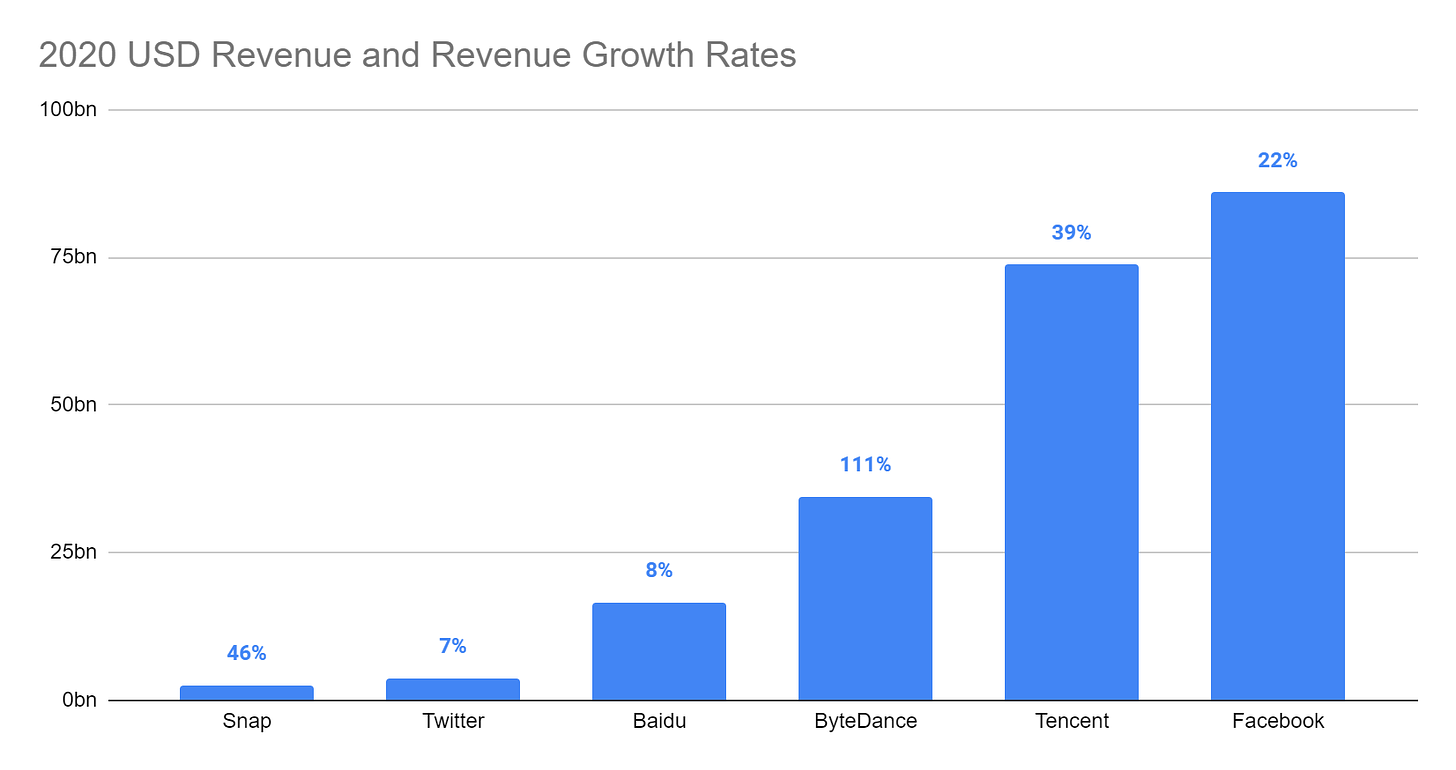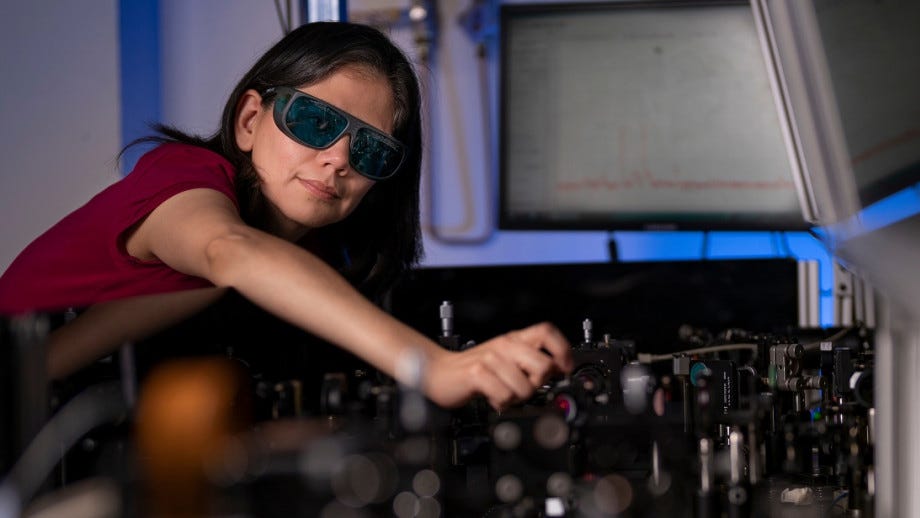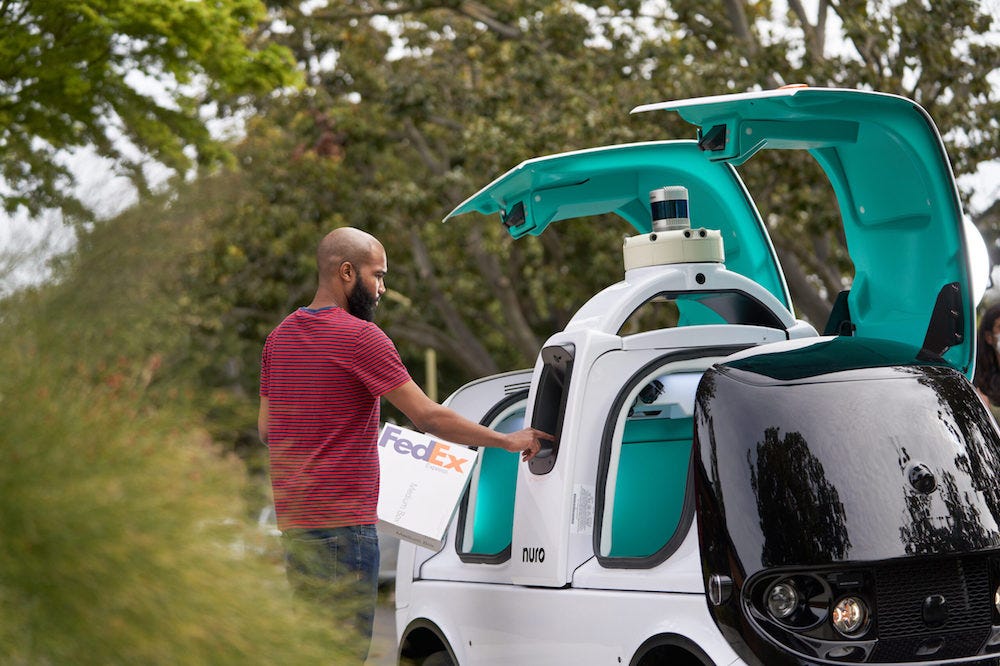Greetings!
Here’s your weekly wrap of the latest technology, innovation, and finance news.
App Economy
TikTok-owned ByteDance had a stellar 2020 with revenue growing 111% to $34.3 billion.
The rapid growth underscores the excitement around ByteDance, a private company, and why its valuation has reportedly been pegged north of $100 billion.

Finance
HK-based crypto-trading startup Amber Group has raised $100 million at a $1 billion valuation.
Founded by a group of former investment bankers in their twenties, Amber initially set out to apply machine learning algorithms to quantitative trading but pivoted in 2017 to crypto when the team saw spikes in virtual currency’s trading volumes. The startup now serves both institutional and individual investors, offering them algorithmic trading, electronic market-making, high-frequency trading, OTC trading, borrowing and lending, derivatives, among other products.
23andMe, the DNA testing company, listed by merging with a Richard Branson SPAC(ticker “ME”).
Wojcicki says the company sees big things ahead for both its consumer and drug research & development platforms. Roughly 80% of 23andMe’s now-11 million members opt into sharing their genetic information (de-identified) for research in drug development.
“Our genetics represent all of life on this planet, and we have the opportunity to understand what it means and with that, it will improve your own life but also contribute to all kinds of research discoveries,” Wojcicki said.
South Korean game developer Krafton filed to list in July (see the Korean prospectus). The company generated $1.5 billion in revenue last year, with the bulk of its sales coming from their battle royale shooter PUBG. The listing price will value Krafton at US$25 billion, above Take-Two Interactive (US$20 billion) and Nexon (US$21 billion) but below Electronic Arts (US$40 billion).
The key question Krafton will have to answer is whether it can grow to become more than a one-hit wonder. The company is almost wholly dependent on its blockbuster, genre-defining PUBG, which produced most of its 1.67 trillion won revenue last year, according to a regulatory filing.

Health
BioNTech, which helped develop the Pfizer/BioNTech COVID-19 vaccine, has now dosed its first patient in their Phase II trial of an mRNA-based cancer vaccine.
“Our vision is to harness the power of the immune system against cancer and infectious diseases. We were able to demonstrate the potential of mRNA vaccines in addressing Covid-19. We must not forget, that cancer is also a global health threat, even worse than the current pandemic,” said BioNTech’s co-founder and CMO Özlem Türeci.
Mouse Health
An mRNA vaccine has yielded full protection against malaria in mice.
“Our vaccine achieved high levels of protection against malaria infection in mice,” said Katherine Mallory, a WRAIR researcher at the time of the article’s submission and lead author on the paper. “While more work remains before clinical testing, these results are an encouraging sign that an effective, mRNA-based malaria vaccine is achievable.”
Streaming
Nielsen has a new metric that provides an apples-to-apples comparison on how TV screen time is split between traditional linear TV, streaming services, and other things like playing video games. Streaming share is growing rapidly.
On Thursday, the firm reported that 64 percent of the time American viewers used their television sets in May 2021 was spent watching network and cable TV, while they watched streaming services about 26 percent of the time. Another 9 percent of the time, they were using their TV screens for things like video games or watching programs or films they had saved on DVR.
The streaming share is increasing rapidly. It stood at about 20 percent last year, Nielsen said; in 2019, it was about 14 percent. A Nielsen spokesman said that the firm anticipates the streaming share could go up to about 33 percent by the end of the year.
Batteries
General Motors is accelerating its plans to produce electric vehicles.
The company said it planned to spend $35 billion on E.V.s in the five years ending in 2025. That’s the second increase in the last eight months. A year ago, G.M. said it would spend $20 billion in that period, and in November increased the figure to $27 billion.
“E.V. adoption is increasing and reaching an inflection point, and we want to be ready to produce the capacity that we need to meet demand over time,” G.M.’s chief financial officer, Paul Jacobson, said in a conference call with reporters. “We know we’ll need those battery plants to further our goals.”
Mobility
Baidu has teamed up with state-owned automaker BAIC Group to build 1,000 driverless cars over the next three years, ahead of launching a commercial robotaxi service.
With the BAIC partnership, Baidu will be hoping to take robotaxis beyond just the testing phase and to a mass-market rollout of a service.
Waymo raised another $2.5 billion for autonomous vehicle development.
FedEx is going to test Nuro’s autonomous delivery vehicles in Houston.
Robotics
A Swiss-German team has demonstrated how to convert a walking excavator into an autonomous excavator capable of building stone walls and building trenches (see the paper).
“There is no excavator I know of that can [autonomously] execute complex tasks such as excavation of free-form embankments or building a dry stone wall,” says Jud. One of the hardest things in converting the excavator from human-operated to a computer running the open-source software Ubuntu in its cabin was adapting the controls to direct the machine’s hydraulic pumps, he says.

Space
NASA chose two winners for the Vascular Tissue Challenge, a $500,000 competition they announced back in 2016, which brings us one step closer to printing artificial organs in space.
What’s different about printing organs and tissues on Earth versus doing it in space? Boland described the difference in techniques by likening the mechanics of printing with Play-Doh to printing with honey.
China has launched three astronauts into space in their first human-crewed mission in five years. The astronauts will spend approximately 90 days aboard Tiangong, China’s new modular space station currently under construction.
With that, the Chinese station, called Tiangong, or Heavenly Palace, became one of two populated outposts in orbit. The other, the International Space Station, has operated for more than two decades, but its future is uncertain because of age, budget constraints and tensions between its main partners, the United States and Russia.
The Disinformation Age
Georgetown researchers found that AI is pretty good at writing disinformation these days.
“With a little bit of human curation, GPT-3 is quite effective” at promoting falsehoods, says Ben Buchanan, a professor at Georgetown involved with the study, who focuses on the intersection of AI, cybersecurity, and statecraft.
The Georgetown researchers say GPT-3, or a similar AI language algorithm, could prove especially effective for automatically generating short messages on social media, what the researchers call “one-to-many” misinformation.
Quantum Mechanics
Researchers at the University of Copenhagen have developed a new technique that keeps quantum bits of light stable at room temperature. Normally they need to be cooled to -270 degrees Celsius (see the paper).
“We have developed a special coating for our memory chips that helps the quantum bits of light to be identical and stable while being in room temperature. In addition, our new method enables us to store the qubits for a much longer time, which is milliseconds instead of microseconds — something that has not been possible before. We are really excited about it,” says Eugene Simon Polzik, professor in quantum optics at the Niels Bohr Institute.
Regulation
Biden appointed Columbia University law professor Lina Khan as the Federal Trade Commissioner, which suggests the focus of US antitrust policy may shift from the impact on consumers to a more European-style focus on the impact on competitors.
In a 2017 Yale Law Journal article, “Amazon’s Antitrust Paradox,” Ms. Khan argued that the “consumer welfare” standard is “unequipped to capture the architecture of market power in the modern economy.” Amazon, she said, increased its dominance by charging lower prices and growing its business, thereby undercutting competitors.
Amazon and other tech giants deserve antitrust scrutiny for some of their business practices, such as Amazon’s dominance in e-books. But that e-book dominance was abetted by a Justice antitrust suit that undermined competition from Apple. Killing the consumer-welfare standard would punish companies for reducing prices and innovating.
Advanced Materials
Researchers at the Australian National University (ANU) have developed a new night vision technology that is extremely lightweight, cheap, and easy to mass-produce (see the paper).
“Our technology is able to transform infrared light, normally invisible to the human eye, and turn this into images people can clearly see – even at distance.
“We’ve made a very thin film, consisting of nanometre-scale crystals, hundreds of times thinner than a human hair, that can be directly applied to glasses and acts as a filter, allowing you to see in the darkness of the night.”

Other Snippets
Facebook will start testing ads within Oculus Quest apps.
Canon put AI cameras in its Chinese offices so that only smiling workers could enter, a surefire way to boost morale…
A team from MIT and the Broad Institute have created a DNA-based file storage system complete with Boolean search (see the paper).
DNA is an ultrahigh-density storage medium that could meet exponentially growing worldwide demand for archival data storage if DNA synthesis costs declined sufficiently and if random access of files within exabyte-to-yottabyte-scale DNA data pools were feasible. Here, we demonstrate a path to overcome the second barrier by encapsulating data-encoding DNA file sequences within impervious silica capsules that are surface labelled with single-stranded DNA barcodes.
Have a great week,
Thomas





